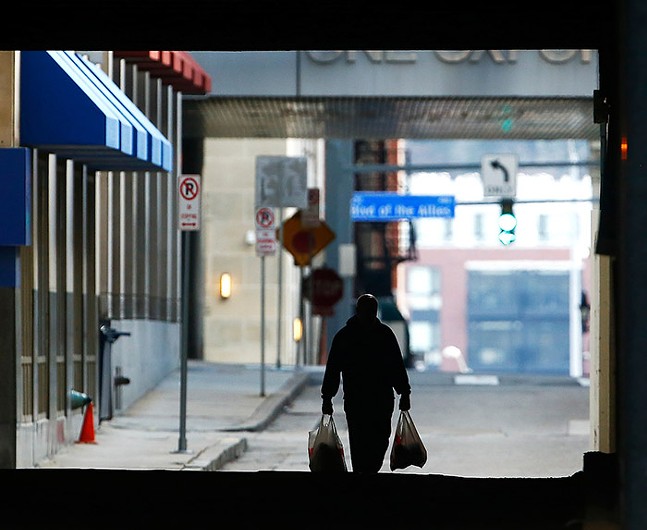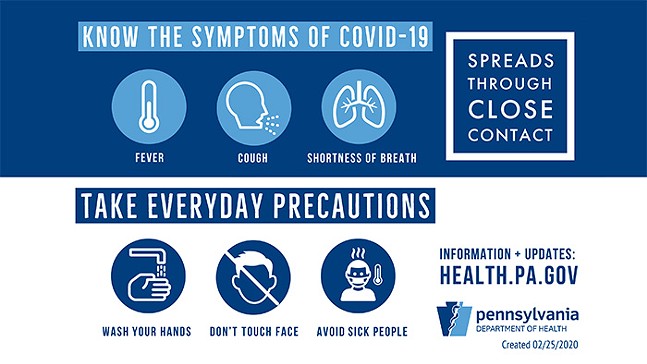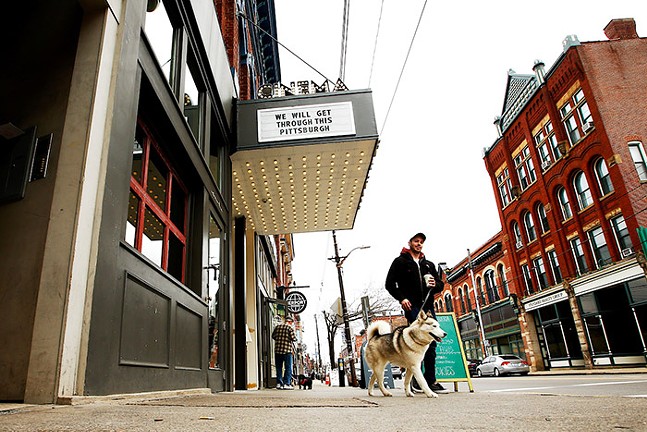
CP photo: Jared Wickerham
"We Will Get Through This Pittsburgh" displayed on the marquee at Row House Cinemas in Lawrenceville
It’s more than official: Coronavirus is a serious health threat, and no American leaders are now taking it lightly.
As of March 18, there are at least 133 presumptive positive or confirmed coronavirus cases in Pennsylvania. The Pittsburgh-area has at least 14, with 12 confirmed or presumptive positive cases in Allegheny County and one each confirmed in Beaver and Washington counties. The virus has spread exponentially in other countries, including China and Italy. Hundreds of thousands of cases have been confirmed, and more than 8,700 people have died worldwide due to coronavirus.
As a precaution, hundreds of events and gatherings have been canceled or postponed throughout the region. The city, county, and state have suggested “social distancing” techniques so that people don’t potentially spread the virus through touch or close interactions.
Coronavirus, which causes the disease COVID-19, has already impacted almost every aspect of life in Pittsburgh, from school closings to public health behavior to the local economy. And as the virus likely spreads over the foreseeable future, many more aspects of life in the Steel City will be affected.
In response to coronavirus, Pittsburgh City Paper has created a guide to help readers and residents understand how the virus has affected the region, and offering suggestions to best cope during the global pandemic.
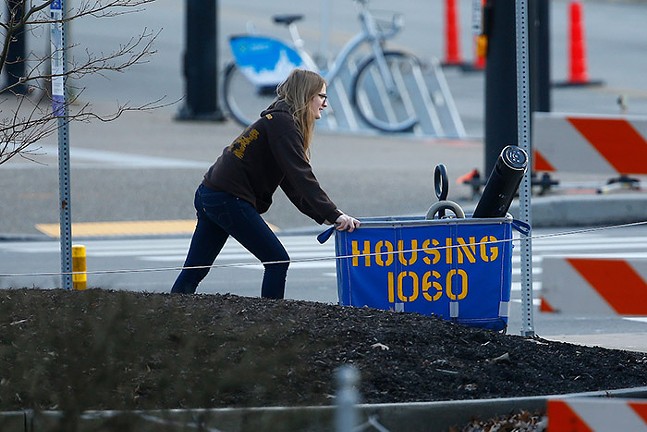
CP photo: Jared Wickerham
A student pushes a housing cart with her belongings on the University of Pittsburgh campus in Oakland on Sun., March 15.
Public Schools
Starting March 16, all public schools in Pennsylvania are shut down for at least two weeks. Some school districts, like Fox Chapel and Mt. Lebanon, have instituted even longer mandatory shutdowns. Fox Chapel public schools are closed at least until April 13, and Mt. Lebanon public schools are closed until at least April 14.These mandatory closures mean children are mostly confined to their homes, since Fitzgerald has called on non-essential businesses, including childcare facilities, to also close down for at least two weeks.
Students who normally receive free meals while at school can still be served meals from select school staff at each public school. Pittsburgh Public Schools is serving “Grab and Go” meals at all 54 city schools and early childhood education centers from 11 a.m.-1 p.m. on weekdays. Clayton Academy and Student Achievement Center are also serving take-away meals.
In total, PPS is providing take-away meals at 30 locations across the city. They are listed below:
Pittsburgh Morrow: Primary Building - 1611 Davis Ave, Brighton Heights
Pittsburgh Perry High School: 3875 Perrysville Ave., Observatory Hill
Northview Heights Public Safety Center: 441 Mount Pleasant, Northview Heights
Pittsburgh Project: 2801 N Charles St., Perry South
Pittsburgh Spring Hill: 1351 Damas St., Spring Hill
Arlington Recreation Center: 2201 Salisbury St., Arlington
Pittsburgh Beechwood: 810 Rockland Ave., Beechview
Pittsburgh Carrick High School: 125 Parkfield St., Carrick
St. Paul AME Church: 400 Orchard Place, Knoxville
Tree of Life Brookline: 1036 Brookline Blvd., Brookline
Pittsburgh Roosevelt: Intermediate - 200 The Blvd., Carrick
Warrington Recreation Center: 329 E. Warrington Ave., Allentown
Pittsburgh West Liberty: 785 Dunster St., Brookline
Pittsburgh Whittier: 150 Meridan St., Duquesne Heights,
Pittsburgh Colfax: 2332 Beechwood Blvd., Squirrel Hill
East Hills Community Center: 2291 Wilner Drive, East Hills,
Pittsburgh Faison: 7430 Tioga St., Homewood
Glen Hazel Community Center: 895 Johnston Ave., Glen Hazel
Pittsburgh Greenfield: 1 Alger St., Greenfield
Pittsburgh Mifflin: 1290 Mifflin Road., Lincoln Place
Pittsburgh Obama: 515 N Highland Ave., East Liberty
Paulson Recreation Center: 1201 Paulson Ave., Lincoln-Lemington
Salvation Army Homewood: 8020 Frankstown Ave., Homewood
Pittsburgh Chartiers Early Childhood Education Center: 3799 Chartiers Ave., Windgap
Emanuel United Methodist Church for Kids Meal Network: 825 Lorenz Ave., Elliott
The M Garden: 3049 Chartiers Ave., Sheraden
Salvation Army: Westside -1821 Broadhead Fording Rd., Fairywood
Pittsburgh Westwood: 508 Shadyhill Rd., Westwood
Pittsburgh Miller: 2055 Bedford Ave., Hill District
Pittsburgh Weil: 2250 Centre Ave., Hill District
School districts are also considering the potential learning loss from prolonged closures. The Pennsylvania Department of Education is encouraging students and parents to access online learning opportunities. PPS is suggesting students use the district’s CLEVER portal located at pghschools.org/studentresources to learn more.
Local colleges and universities have also canceled face-to-face classes and events for the foreseeable future.

Hospitals and Testing
Pittsburgh-area residents showing symptoms of coronavirus or those who have been in contact with known infected patients should try to get tested. According to the Centers for Disease Control and Prevention, symptoms after 2-14 days of exposure include fever, cough, and shortness of breath. Emergency warning signs of COVID-19 that require immediate medical attention are difficulty breathing or shortness of breath; persistent pain or pressure in the chest; new confusion or inability to arouse; bluish lips or face.There is testing available in the Pittsburgh area. Central Outreach Wellness Center has partnered with Quest Diagnostics and has drive-up testing at two locations: Pittsburgh Zoo main parking lot, 7370 Baker St., Highland Park and 2360 Hospital Drive, Aliquippa. Testing begins at 11 a.m. each day. Central Outreach Wellness Center and Quest Diagnostics has limited test kits, so testing will be offered based on screening questions. Willing patients need to present a photo ID and an insurance card to be tested. Central Outreach Wellness will not turn anyone away who doesn't have an insurance card, according to a press release.
UPMC has developed its own test for coronavirus and has opened a testing facility in the South Side. However, this facility is not open to the public. According to a press release, “Patients must have a physician referral approved by UPMC’s infection prevention team and an appointment to have their specimen collected for testing by either UPMC or public health authorities.”
UPMC says it plans to open up similar facilities in Harrisburg, Erie, Williamsport, and Altoona.
Allegheny Health Network will be providing drive-up collection sites for patients who have been previously evaluated by an AHN provider for COVID-19 symptoms, and receives a valid prescription order. A collection site in Wexford opens on March 18, and sites in Bethel Park, Monroeville, and Erie should be open within a week. Sites are open from 8 a.m.-5 p.m. daily and should be able to accommodate about 20 patients an hour, according to AHN officials.
Additionally, people going to area hospitals for other medical reasons should know they will likely be screened for coronavirus. AHN announced on March 16 that all visitors will be screened and asked if they have traveled domestically or internationally in the last 14 days and if they have a cough or fever. Those who answer yes will not be permitted inside AHN hospitals.
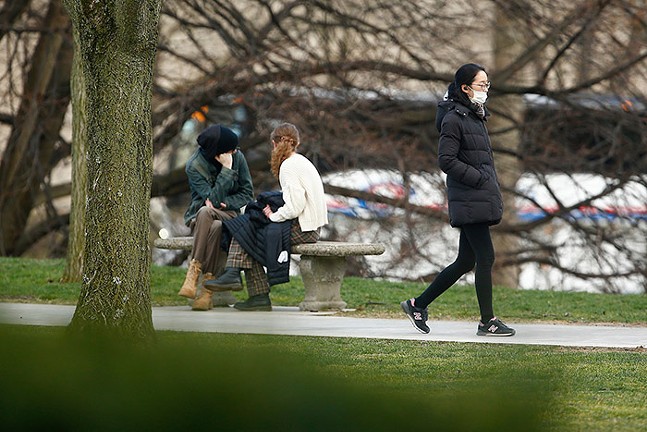
CP photo: Jared Wickerham
A women wears a mask outside of Heinz Chapel in Oakland on Sun., March 15.
Elderly and Vulnerable Populations
The Pittsburgh-area has one of the highest average-age of any metropolitan area in the U.S. This means we have a lot of elderly people and senior citizens who are the most vulnerable to negative health effects, including death, related to COVID-19. Elderly residents are advised to stay at home as much as possible and to make sure they have access to several weeks of medications and supplies in case they need to stay quarantined at home for prolonged periods of time. Many local pharmacies provide home delivery, and orders can be placed through phone calls.
Local groups like Wesley Family Services have extensive experience in helping elderly people in the Pittsburgh area, and should be contacted if elderly people need assistance. Groups like Lawrenceville United are trying to build networks to provide up-to-date information for seniors. Look to local community groups and religious entities to see if they need any help getting groceries and other items to seniors in the neighborhood. Local Meals on Wheels groups may also need additional help in servicing seniors during the pandemic.
Starting on March 20, the city of Pittsburgh started to hand out pre-packaged meals for seniors who are currently registered for normal congregate meal service. City will be serving about 100 meals per day. Meals are take-out only and can be picked up between 11 a.m.-1 p.m. on Mondays, Wednesdays, and Fridays at the following locations:
Glen Hazel: 945 Rosselle Court, 15207
Sheraden: 720 Sherwood Ave., 15204
South Side: 12th St & 1 Bedford Square, 15203
Lawrenceville: 4600 Butler St., 15201
Homewood: 7321 Frankstown Ave., 15208
Hazelwood: 5344 Second Ave., 15207
Community groups and religious institutions are also good sources to guide other vulnerable populations towards information about coronavirus. Homeless people may not be following the news as closely as others, and organizations can help explain to them the coronavirus pandemic and help them get services if needed.
East End Cooperative Ministry in East Liberty has stopped serving sit-down meals, and instead is passing out grab-and-go meals. Allegheny County officials are still looking for locations to house the homeless who are not showing signs of COVID-19 symptoms.
Pittsburgh's Urban Redevelopment Authority has approved a new program for households at or below 80% Area Median Income (AMI) who have been affected by the economic impact of the coronavirus pandemic. Beginning Monday, March 23, qualifying households can apply for rent, mortgage, and/or utility payment assistance if their work hours have been cut because of coronavirus closures.
"This is obviously a really critical action today and sorely needed at this moment in time and I commend Jessica Smith Perry and the rest of the URA staff for acting quickly and coming up with this program on such short notice," said URA Board Chair Sam Williamson in a press release.
Interested parties can learn more here. The program is only open to City of Pittsburgh residents who have had hours cut or been layed off because of coronavirus, and are struggling to make rent, mortgage, and/or utility payments.
Immigrants, and those with little-to-no English language skills, should also be guided to groups like Casa San Jose and Jewish Community Center, where people can offer information on the coronavirus in Spanish and different languages.
State Rep. Sara Innamorato (D-Lawrenceville) is also compiling a running list of local COVID-19 resources. This list can be accessed on Innamorato’s official Twitter account.
The United Way of Southwestern Pennsylvania and local foundations like the Heinz Endowments are providing help to people who can’t afford to stock up on necessary groceries and supplies. Contact United Way’s 2-1-1 Southwest helpline for requests related to food, health care, and utility and rent assistance.
Scammers are also trying to take advantage of fear over coronavirus. The CDC recommends not clicking on links from sources you don’t know and to ignore online offers for vaccinations. (There are currently no vaccines or medications available to specially treat COVID-19.) Pennsylvania Attorney General Josh Shapiro is also documenting any price-gouging schemes related to coronavirus for potential prosecution. Information on any price-gouging schemes can be sent to [email protected].
Finances and Loans
The Pennsylvania Department of Labor and Industry announced this week that workers affected by coronavirus may be eligible for unemployment benefits. Reasons for potentially being eligible include working at a business that temporarily closes or goes out of business because of coronavirus; employer reducing hours because of coronavirus; having been told not to work because your employer believes you might get or spread coronavirus; or being told to self-quarantine. Apply at uc.pa.gov/Pages/covid19.aspx.On March 16, Gov. Wolf announced that all non-essential businesses must shut down for at least two weeks. Only grocery stores, pharmacies, and medical centers will remain open, as well as the take-out sections of restaurants.
Service industry workers can also seek help from the Pittsburgh Virtual Tip Jar, a website started by Carnegie Mellon University's Center for Ethics and Policy. Service industry workers can enter their Venmo account information, and people can send tips to their favorite bartender, stylist, and other service industry employees. Reach the website at centerforethicsandpolicy.com/PGHTipJar.html
For small business owners, nonprofit Hebrew Free Loan Association is offering interest-free loans of up to $5,000 for individuals and businesses affected by coronavirus closures. Interested parties can visit hflapgh.org/coronavirusloan to see if they qualify.
Local crowdfunding investor platform Honeycomb Credit is offering relief loans up to $50,000 with a six-month interest only period. Qualifications include between 1-3 years of operating history, and a 2019 with profitability and/or breakeven finances. Visit honeycombcredit.com/relief for more details.
The city of Pittsburgh is gathering information from nighttime businesses that are struggling during the coronavirus closures. They are asking effected business to fill out a survey, so they can help guide appropriate aid.
Federal, state, and municipal governments are also working to collect information on closed businesses to help them make payments on loans currently borrowed and provide financial relief.
On March 18, state Sen. Lindsey Williams (D-West View) announced a Small Business First (SBF) loan program will soon be accepting applications. The current interest rate on these loans is 3%, but according to a press release from Williams, the state government has the authority to lower these rates and has indicated support for doing so. More than $60 million in funds are available. Interested parties can apply here.
Pittsburgh artists have created a crowdfunding page on GoFundMe called the “PGH Artists Emergency Fund,” and are accepting donations to provide at least $250 per artist to help relieve the costs due to canceled gigs and jobs.
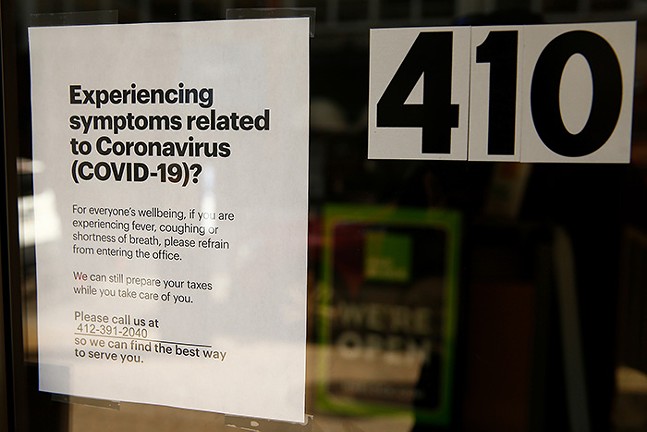
CP photo: Jared Wickerham
A sign hangs on the door of H&R Block on Smithfield Street in Downtown Pittsburgh on Sun., March 15.
Staying Healthy
Stopping the spread of coronavirus is crucial during this time of increasing confirmed cases. One of the easiest and best ways to help is to wash your hands often and thoroughly. Handwashing is capable of reducing respiratory infections by 15-20%. Make sure to scrub with soap for at least 20 seconds. Social distancing is also another effective tool against spreading coronavirus. The White House has said that nobody should gather in groups of more than 10 people. Also, try to stay more than six feet away from people, since you don’t know if they are infected.
For the most part, this means socializing will be much different. Bars and restaurants are closed temporarily in the state, but that doesn’t mean that people can’t go for walks in the park or neighborhood. Remember, just keep your distance from other people.
If you do come into contact with others, try not to greet with a handshake or hug. Elbow or foot taps are preferred, or just wave from a distance. The Pennsylvania Department of Health recommends that children not participate in play dates or sleepovers during the outbreak.
If you are experiencing any mental health crises because of the anxiety and stress related to the global pandemic, text PA to 741741 on your mobile phone, and the Crisis Text Line will connect you to mental health services.
Voting
Pennsylvania’s primary election is scheduled for April 28. It’s not clear if the governor will move the election date as other states have, but Wolf said at a press conference on March 16 that he is "certainly taking that into consideration."Even if the primary stays scheduled for April 28, it may be prudent to take advantage of Pennsylvania’s new mail-in voting law. Citizens can now apply for a mail-in ballot with no reason necessary. This means that people can vote entirely from the comfort of their home.
In the coming days, Allegheny County will be encouraging residents to mail-in votes to slow the spread of coronavirus. Ballots are not yet finalized, but registered voters can request a mail-in ballot by filling out an online or mail application. County election departments will then send voters a ballot to complete and return.
To request a mail-in ballot, fill out an application on paper or online at votespa.com. Registered voters that apply online must present a valid Pennsylvania driver’s license or photo ID issued from the Pennsylvania Department of Transportation. Applications are in English and Spanish.
Note that if you request a no-excuse mail-in ballot, it is best to complete it and vote via mail. Voters who request a mail-in ballot and vote via mail are barred from voting at the polls on Election Day. If you request a mail-in ballot, your polling place will be notified and will flag you so that you don’t try to vote again at the polls. If you didn’t complete your mail-in ballot, and the poll book confirms that you haven’t voted, then you can still go to the polls to vote, but you must request a provisional ballot from poll workers.
Mail-in ballot applications for the upcoming April 28 primary election must be received by your county election office by 5 p.m. on April 21. The final day to register to vote is 15 days before the election. With the primary on April 28, the final day to register to vote is April 13.
As more news develops, we will continue to update this story and our online coverage.

